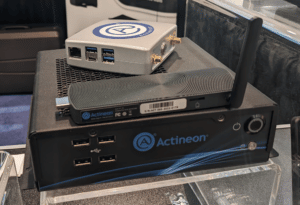Thin Client aka Thinclient
We thank 10Zig Technology for their support. 10ZiG Technology provides cutting-edge Thin Clients and Zero Clients for the latest virtual desktop infrastructure solutions. Our VMware, Citrix and Microsoft ready hardware is designed to suit all user types, from those requiring low-level application support such as Microsoft Office
Thin client computing includes the conventional thin client and zero client market known for HP, Dell, Wyse, IGEL, and others. Typical Windows-embedded OS units. A long cry from the original keyboard and screen matchbox with zero local storage.
You can also convert your “old” conventional PC into a thin client. Google is after the Windows 11 desktop upgrade market with its “new” Chrome Flex (which is not so new).
- Thin Client News March 2024
- HP Thin Client News – t755 and t655 Released
- Thin Client News November 26
- Thin Client News October 2023
- Intel Thin Client – Mini-PC, NAS, 2.5GbE Router AIO
- Thin Client aka Thinclient October Newsbits
- Browser Trackers Are Eating Your Lunch!
- Thin Client News – Citrix Hack and more
- Linux AIO Computer – I-Series Slate Linux Debian 10
- Kiosk Mode for Linux – Lockdown Browser from KioWare
- Thin Client News This Week
- Thin Client News Friday July 21
- Thin Client All-In-One by LG – ChromeOS Flex
- Thin Client RFP – Chromebook
- Thin Client News May 1 – VMware, RTM Locker
- Thin Client RFP – State of North Carolina
- Cloud Computing Provisions in National Defense Authorization Act
- Dell Thin Clients for Ohio Public Employees
- Thin Client News Wrap December 2022
- HP, Lenovo and LG Gain New IGEL Thinclients
Lockdown clients are available as well for those “old systems”. You can use Sitekiosk to lock down a Windows Terminal desktop to prevent unauthorized data transfers and web browsing as well as filter security threats.
And we extend that definition to include Chromebooks and ChromeOS which these days are often less than $300 and complete with remote management.
And now we have ultra-micro players creeping into the digital signage market.
Contact [email protected] with any questions.
What is a Thin Client aka Thinclient?
- Originally all data stored/accessed from cloud (a browser with no hard drive)
- NComputing had some really nice and super inexpensive “workstations”
- Became the marquee deployment for Windows Embedded
- Began adding new ports, functions until it almost became your standard PC (it might cost $600 too)
- With advent of raspberry, high-speed internet, and the pandemic to push it along it is now evolving back towards to ultra-micro less than $200
- A new player in the thin client market is the Raspberry Pi. You can get fully configured touchscreen units now from Amazon for less than $200.
- What we are NOT are the usual Dell or Lenovo office desktops. Those are “fat” clients and typically require singular discrete support and security.
- See our feature is the test and review of the Raspberry Pi 400 as a Thin Client (just add a monitor).
About Us
Since 1999, Thinclient.org has been reporting the thin client computing market as well as the ChromeBook, Zero Client, Android clients, Pi Raspberry Clients and Thick Client market. Generally the cloud computing market since it started with companies such as Citrix back in the late 80s.
What is it?
A thin client is a lightweight[vague] computer that has been optimized for establishing a remote connection with a server-based computing environment. The server does most of the work, which can include launching software programs, performing calculations, and storing data. This contrasts with a fat client or a conventional personal computer; the former is also intended for working in a client–server model but has significant local processing power, while the latter aims to perform its function mostly locally.
Thin client hardware generally supports a keyboard, mouse, monitor, jacks for sound peripherals, and open ports for USB devices (e.g., printer, flash drive, webcam). Some thin clients include legacy serial or parallel ports to support older devices such as receipt printers, scales or time clocks. Thin client software typically consists of a graphical user interface (GUI), cloud access agents (e.g., RDP, ICA, PCoIP), a local web browser, terminal emulators (in some cases), and a basic set of local utilities.
New hardware interfaces includes socket-based enabled devices eliminating the need for a physical USB connection. Bluetooth wireless connectivity is also a big factor for devices.
Computers
- Start with the usual suspects from Dell, HP, Wyse, 10Zig, IGEL, etc
- Add in Chromebooks
- Add in converted desktops running a remote desktop
- You can add in smartphones
- Hardware starts at $25 Pico ITX and Raspberry PI
- You have Power Over Ethernet versions
- Many of the conventional historical thin client computers have taken on so much of the functionality of a standard PC that they are almost a Thin Client in name only. The price can be higher than a standard desktop.
- We have AIO or All-In-One Computers – typically with touchscreens.
Other Links
- Thin Client vs. Thick Client vs. Zero Client: What’s the Right Fit for Your Business?(Opens in a new browser tab)
- Thin Client vs. Thick Client vs. Zero Client(Opens in a new browser tab)
- Thin Client Market Forecast August 2020(Opens in a new browser tab)
We also maintain orphan posts page

